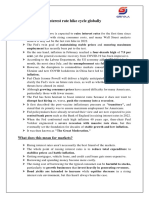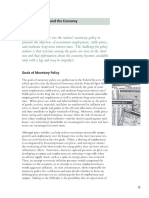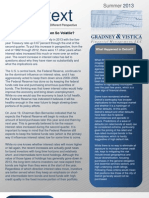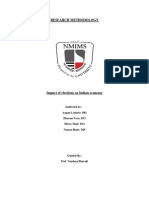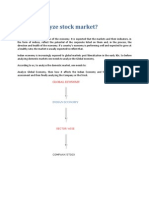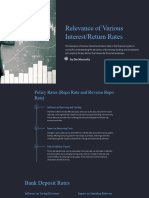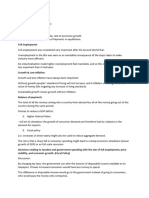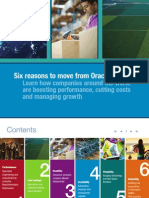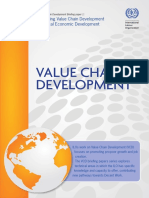The intricate and highly volatile nature of the stock markets need no introduction; it is this attribute that makes
it very difficult
to predict a stock’s future performance . The characteristic of the market impacts not only businesses and individual
investors ,but the economy as a whole.
Out of all the myriad factors affecting the stock market performance, the most important are as follows-
Ø INTEREST RATE CHANGES: The Central Bank has a far-reaching impact over the level of engagement in the financial
market.Generally, interest rates and stock market have an inverse relationship. When
interest rates rise, share prices fall. Bonds become more attractive . When interest rates
rise, it can make borrowing money for a company more expensive , which means they
have less money to invest back in the company and less cash flow stability , which
typically puts pressure on share prices. The vice-versa is true when interest rates rise.
Interest Rates : An Overview
When the Reserve Bank of India acts to increase the discount rate, it immediately elevates short-term borrowing costs for
commercial banks and other financial institutions. This has a ripple effect on virtually all other borrowing costs for
companies and customers in an economy. Because it costs financial institutions more to borrow money, these same financial
� institutions often increase the rates they charge their customers to borrow money. So, individual customers are impacted by
increases in their credit card and mortgage interest rates , especially if these loans carry a variable interest rate. When the
interest rate for credit cards and mortgages increase, the amount of the money that consumer spends decreases.
Consumers still have to pay their bills and spend money on necessary goods and services in order to sustain themselves. When
these items become expensive , households are left with less disposable income . When consumers have less discretionary
spending money, businesses revenue and profits decrease.
Hence, it is evident that businesses are not only impacted by higher borrowing costs but they are also exposed to the
detrimental effects of reduced consumer demand. Both of these factors can weigh on earnings and stock prices. Higher interest
rates also mean future discounted valuations are lower as the discount rate used for future cash flow is higher.
However, some sectors stand to benefit from interest rate hikes. One sector that tends to benefit the most is the financial
industry. Banks, brokerages , mortgage companies and insurance companies ‘ earnings often increase - as interest rates move
higher - because they can charge more for lending.
In the light of the current market scenario, the RBI has reduced the interest rate. This is done when the economy is in
slump and the RBI cuts the bank rate to stimulate financial activity. Investors and economists alike view lower interest rates as
catlysts for growth - a benefit to personal and corporate borrowing . This, in turn, leads to greater profits and a robust economy.
�Lower interest rates reduce the cost of borrowing for the commercial banks . Consequently, interest rates on bank instruments
like FDs get reduced. This causes the companies , corporates and other investors to borrow more from the commercial banks .
There is more cash flow in the economy in general. Demand for consumer goods and services increase. Consumers will spend
more , with the lower interest rates making them feel that perhaps, they can finally afford to buy that new house or send their
children to a private school . Rate sensitive sectors in the economy- automobile companies and real estate companies
normally tend to benefit from lower rates. Since people have more money in hand for the purchase of large items such as
vehicles , houses and so on, this excess demand of automobiles , houses may not be accompanied by an equal increase in the
supply of automobiles , houses etc, causing the price of the automobile sector and the real estate companies and the various
fmcg companies to increase. Through their increase in borrowings , they are able to invest more money back into the stock
market. Since this increases cash flow stability in the stock market , it reduces pressure on the stock prices and hence stock
prices for most of the companies go up except for the financial sector. The commercial banks , NBFCs, insurance companies
lose their source of income in terms of the lower interest income received from their borrowers due to reduction in the lending
rate of interest. Businesses will enjoy the ability to finance operations , acquisitions , thereby increasing their future earnings
potential and expansions at a cheaper rate , thereby propelling their stock prices to increase manifold.
�Investment Decisions when interest rates fall :
Mr X must reduce the holding of shares of the banks like the HDFC Bank Ltd, IDFC First Bank Ltd as their stock prices have
undergone a significant decline in terms of the current market scenario. HDFC Bank Ltd. comprises 16.82 % and IDFC First Bank Ltd.
comprises 8.01% of the total allocation of the shares of all companies in his portfolio respectively. He should either exit from holding
the shares of these companies or reduce the proportion of these shares held by a significant amount . Other cyclical stock sectors such
as the consumer discretionary,technology,real estate and automobile sectors will witness an upsurge in the prices of the respective
shares. It is evident as the stock prices of TVS Motor company Ltd and BirlaSoft Ltd. which comprise of 8.54% and 8.05% of the total
portfolio allotment of Mr . X have witnessed an increase during this period. While falling rates have historically been positive for
stocks in general, they might provide a greater boost to small cap companies. Small companies generally carry more debt than larger
companies which means they have felt the pinch of higher rates more than their larger brethren- and could benefit more from relief on
rates. That advantage could be particularly pronounced if the economy does avoid recession, and if small caps can deliver on bullish
consensus earnings- growth estimates for 2024. Therefore, it is prudent for Mr. X to introduce the allocation of small cap stocks in his
portfolio that belongs to the automobile sector, realty sector, IT and the small fmcg companies like Future Retail Ltd, Housing
Development & infrastructure Ltd. (HDIL), Nirlon Ltd, Hemisphere Properties India Ltd.(HEMI PROP), KPIT Technologies Limited
(KPITTECH), Happiest Minds Technologies Limited (HAPPSTMNDS), IndiaMART InterMESH Limited (INDIAMART), Firstsource
Solutions Ltd. (FSL), Force Motors Ltd. (FORCEMOT), Minda Corporation Ltd. (MINDACORP), JK Tyre & Industries Ltd.
(JKTYRE) and so on. Some of the fmcg companies that belong to the category of small cap companies by market capitalisation include
Hindustan Foods Ltd.(HNFDS),
� Tasty Bite Eatables Ltd. (TASTYBIT), Tata Coffee Ltd. (TATACOFFEE), Coffee Day Enterprises Limited (COFFEEDAY)
and so on.
Ø POLITICAL SCENARIO: Every 5 years, the stock market experiences significant volatality during the election season.
Nifty and Sensex often reach their all-time highs, leading to exponential rallies. Similar case
is observed as the 2024 general elections approach, influenced by various political aspects
and government agendas introduced around this time. The impact of elections on stocks is
significant . This results from various policy changes and political actions by parties to
secure their position in the upcoming elections. A major reason behind such a heavy election
influence on the stock market is that political parties try to stimulate the economy rapidly to
secure their chances of getting re-election.This is the main reason why the impact of elections
on stocks is most valuable during the pre-election period. However, this impact gradually
reduces in the short term and more slowly in the long term post election. The newly elected
government might focus on a particular sector or temporarily pause its growth . Consequently,
stocks in that sector can experience either a positive or negative impact accordingly. The stocks
of the real estate and infrastructure sectors will rise , for instance , if the winning party intends
to concentrate on building the nation’s infrastructure . Similarly, the stock values of
pharmaceutical businesses will drop if the winning party’s election program contains policies that
could negatively impact the industry. People’s attitudes heavily influence the stock market post-
election .
� People who favour the government invest more in the market; and those who oppose it often
reduce their positions. This ultimately impacts the stock market on a major scale . Election
infulence oh the stock market greatly depends on its results. If the ruling party is re-elected, it
typically signals political stability leading to market growth . However, if a new government is
elected, the situation can be quite different. These factors might affect the stock directly or
indirectly after an election season ends.
Impact of the current political scenario on the stock market:
The current government has supported privatisation for the past five years. Privatisation occurs when a government - owned
business ,operation , or property becomes owned by a private , non-government party . Privatisation may also describe a transition that
takes a company from being publicly traded to becoming publicly held. This is referred to as corporate privatisation. When a public
company goes private, it is delisted from the stock market and is no longer owned by its shareholders. Control instead goes to an
individualor a select group of private shareholders. If the current government remains in power, it is going to continue with its agenda
of privatisation. When a public company goes private, its owners buy out the current shareholders’ stock. Shareholders who voted to
approve the decision to go private will have agreed to a certain valuation. That valuation and the number of outstanding shares
�determine how much one receives in the buyout.
It is important to note that the cash one receives for one’s shares might be subject to capital gains tax, and the buyout might
also throw his/her portfolio out of balance. Mr. X can lessen the potentially negative effects of a buyout by preparing well in
advance for major changes in his portfolio. One way to do that is to diversify. Having different types of assets in an
investment portfolio may be helpful in case something happens to or changes with one of them. A company going private is
not the only change that can have an adverse effect . Diversification also eases the pinch if a company’s stock value plummets
or the company goes out of business.
However, elections are closer , and the opposition party has never supported privatisation and tends to implement heavy taxes
on corporate individuals for welfare. If it comes to power, the stock market would exhibit a negative trend.
With respect to the current stock market volatility, one suitable option for Mr. X is playing defence. Among equities ,
defensive stock market sectors including consumer staples , utilities, and health care have outperformed during bear markets.
The goods and services these sectors supply tend to be in demand regardless of economic or market conditions. They also
generate plenty of cash, supporting relatively high dividend yields. Some companies that can be categorised as defensive stock
market sectors are Hindustan Unilever, Reliance Industries,ITC, NHPC,NTPC,Adani Green Energy, Reliance Industries, Dr.
Reddy’s Laborataries,Abott, Glenmark Pharmaceuticals and so on.
�Analysts are busy speculating whether PM Narendra Modi will hit a hattrick on June 4 election result day . Going by
promisesmade in BJP’s election manifesto , all- things-capex is emerging as the biggest investing mantra before elections. As a
result all infrastructure linked sectors such as industrials, engineering, capital goods,utilities, defence,cement, green energy,
logistics, semiconductors , railways,real estate, etc stand to benefit. Mr.X should restructure his stocks and align his portfolio
with these sectors. He should increase the holding of shares of companies like Birlasoft Limited, ITC Ltd, Reliance Industries
and enter into the stocks of NHPC, NTPC, Adani Green Energy, Powergrid, Infosys etc.
